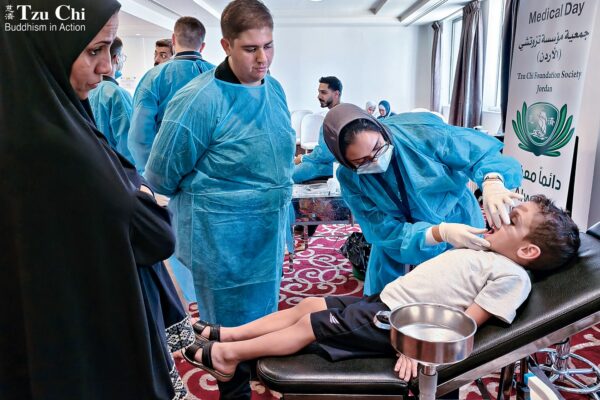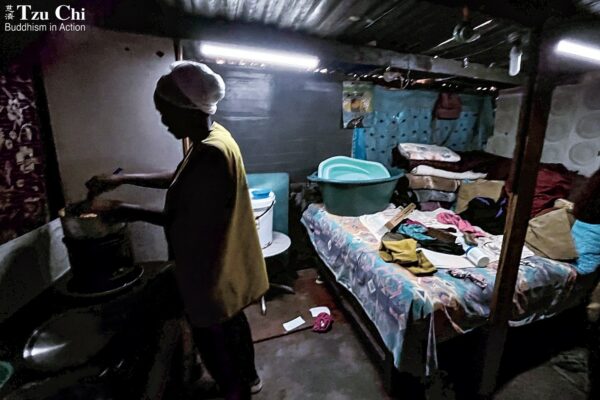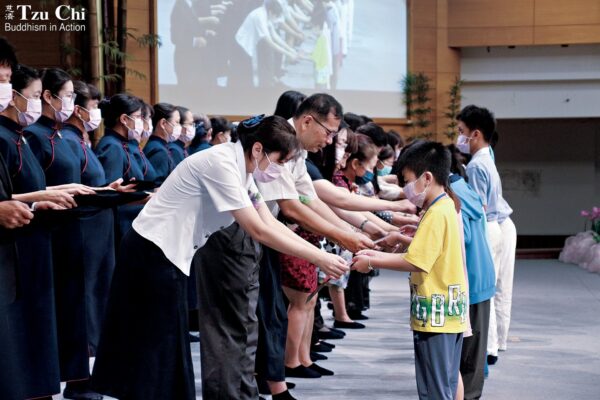Narrated by Pan Ji-li
Interviewed and compiled by Zhang Yu-fan
Translated by Wu Hsiao-ting
Serving at a disaster scene and seeing the pain of those who have lost loved ones has a tremendous impact on Tzu Chi volunteers. Exposure to such suffering is difficult, but they stick to their posts. Such experiences remind them of life’s impermanence and prompt them to make the best of their limited life spans by creating positive differences in the world.
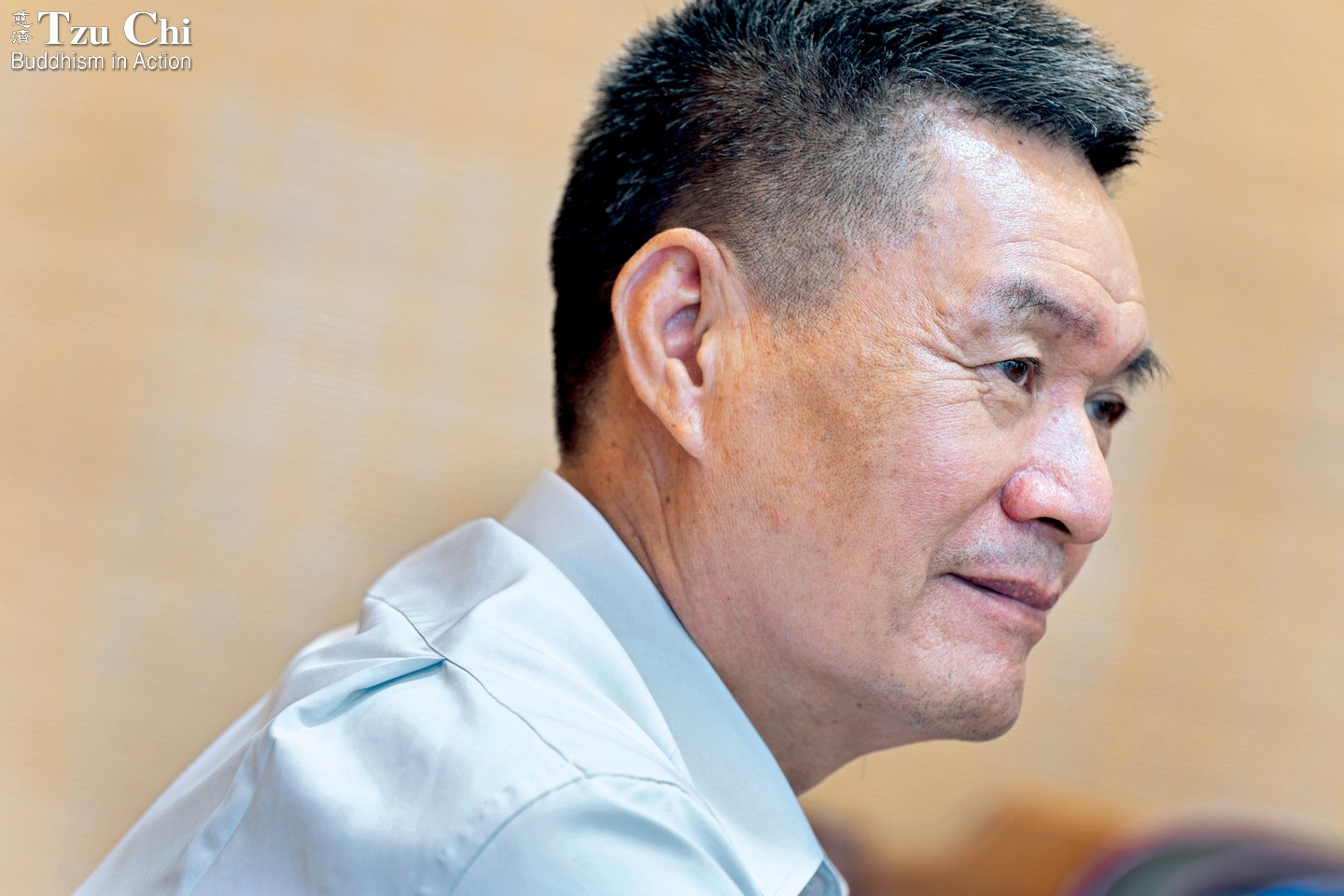
Pan Ji-li (潘機利), an entrepreneur, has for five years been the convener for the Tzu Chi Kaohsiung Disaster Coordinating Center. Every time a disaster occurs in Kaohsiung, he drops his work and rushes to the scene to assess damage. His friends and relatives often chide him good-naturedly for putting his volunteer work above his business. Hsiao Yiu-hwa
A fire broke out in a 40-year-old, 12-story building in the wee hours of the morning of October 14, 2021, in Kaohsiung, southern Taiwan. It was past five when I arrived at the disaster scene. Streets at the scene that should have been shrouded in darkness at that time were illuminated brightly by the conflagration. I didn’t think I’d ever forget the scene in front of me: a once famous landmark that had seen better days, blackened by the fire, permeated with smoke. Many residents awoke during the fire, choking on the smoke. Too late to make their escape by that time, they rushed to their balconies or windows and cried out for help. Some brandished their flashlights in a desperate effort to attract attention.
Many family members gathered outside the building, holding placards hand-printed with doorplate numbers, anxiously hoping that the rescue workers could save their loved ones from the fire. Firefighters worked non-stop in a relay effort to put out the conflagration. They were racing against time.
Zhang Jian-kun (張建崑), a fellow Tzu Chi volunteer, lives near the fire scene. Immediately after the fire broke out, he and his wife purchased bottled water and rushed to the burning building to distribute it to police officers and firefighters on-site. The blaze had raged for more than two hours by the time I arrived. I figured that the firefighters were very hungry and exhausted after working for so long, laden with oxygen tanks and other heavy equipment. I talked with other volunteers on-site and asked them to rustle up some breakfast and coffee for the firefighters to help them replenish their energy.
By 7:30 a.m., the conflagration had been successfully brought under control, but the firefighting team continued to spray the building with water to bring down the temperature. Despite the heavy smoke that continued to spew from the building, firefighters entered, hoping to find people still alive and get them to safety. Some time after ten, the first deceased was transported by a fire brigade crane to ground level. The people that had perished in the fire were concentrated on the seventh to 11th floors. Their number turned out to be more than expected, so one more fire crane truck was brought in to help retrieve the bodies.
Medical professionals had been waiting on-site for some time with stretchers to help save lives. Everyone was praying for a miracle and hoping that the next person brought down would be alive. Sadly, the cranes continued to deliver more of the dead. Everyone’s heart was heavy.
As one body after another was recovered from the building, waiting family members broke down and burst out crying. Our volunteers, clad in raincoats due to the rain, pressed their palms together and chanted the Buddha’s name to pray for peace for the departed souls. As the death toll continued to climb, I ached to think how many unfortunate families would be torn asunder by this tragedy.
Suddenly, I saw the body of a middle-aged man wearing a helmet and a backpack being brought down, his legs and arms bearing tattoos partly obscured by his short-sleeved T-shirt and short pants. Soon thereafter, I heard a man that looked to be in his 80s lash out at the corpse: “My deplorable gangster son! I can admit you were good for nothing, but how could you be such a fool that you didn’t even run for your life?” I went up to the elderly man and asked what had happened. It turned out that the man had found more than 40,000 New Taiwan dollars (US$1,300) in his son’s backpack. “What a fool!” exclaimed the father. “Even when it was time to run for his life, he put on his helmet and went to look for his money!” Everyone around and I could hear the heartbreak and sadness of a father who had lost his son behind the words of anger and complaint.
It was past four in the afternoon when the rescue and recovery operation came to an end. Forty-six people died in the conflagration, making it the deadliest fire in Kaohsiung’s history. The disaster had killed even more people than the shocking gas explosions that rocked Kaohsiung’s Qianzhen and Lingya districts in 2014.
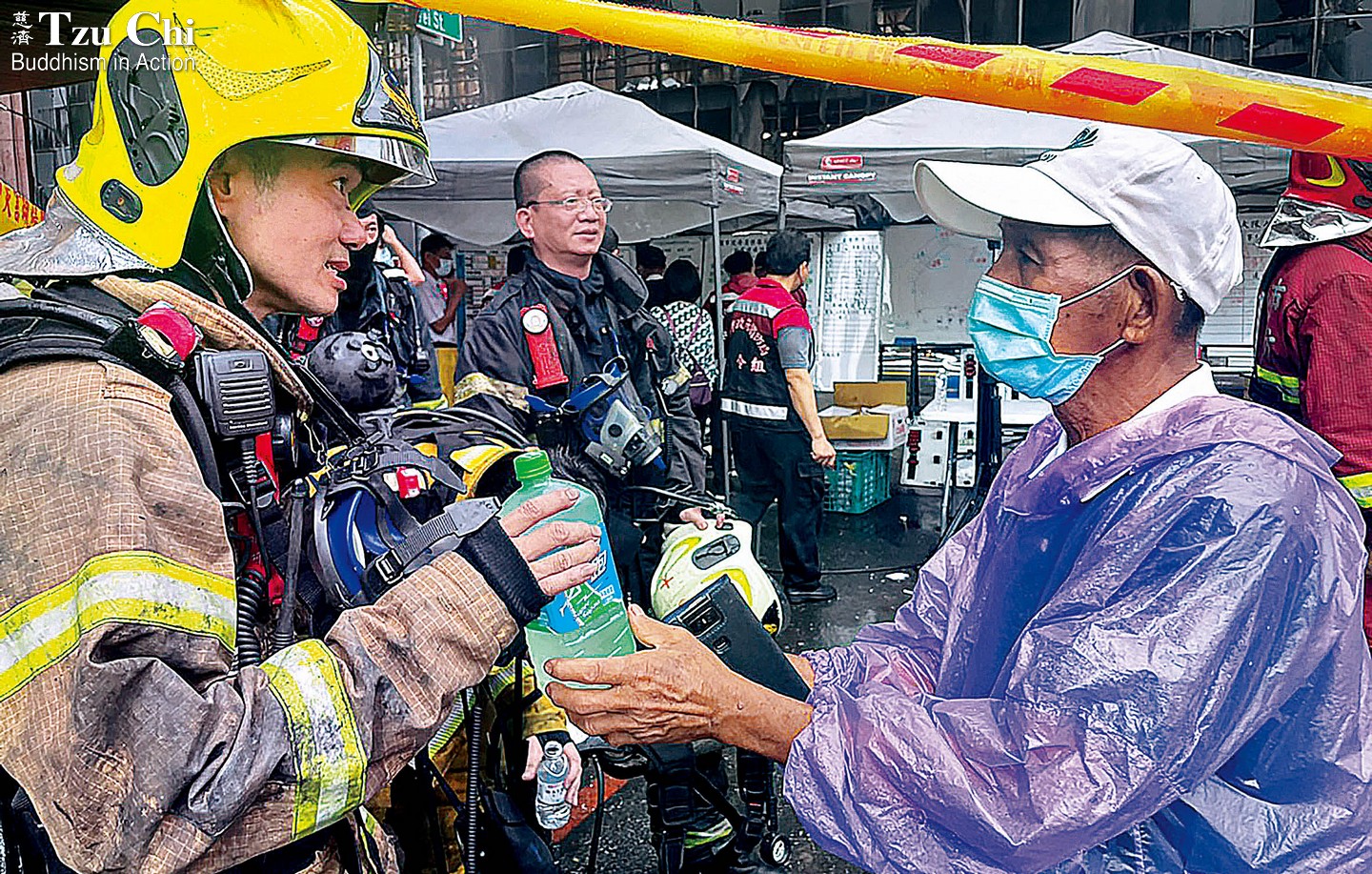
A volunteer offers a bottle of sports drink to a firefighter. A 12-story building in Yancheng District, Kaohsiung, southern Taiwan, caught fire on October 14, 2021. More than 200 firefighters were mobilized to put out the fire and rescue lives. They were kept busy from the wee hours of that morning to the afternoon. Pan Ji-li
We must be stronger than the families
At two p.m. on October 16, a soul-summoning ritual was held at the disaster site. We Tzu Chi volunteers mobilized again to offer support to the heartbroken family members. Before the ritual started, I mentally prepared my fellow volunteers for the task ahead by reminding them that since many people had been killed, there would surely be many family members present that needed our care and support. I reminded everyone to be strong. However, when the 46 soul-guiding banners, bearing prayers and the names and birth and death dates of the deceased appeared before our eyes, we couldn’t help feeling stunned. And when the bereaved called out their family’s names in heartrending voices, many volunteers couldn’t maintain their composure. Tears welled up uncontrollably in their eyes.
The air was thick with an aura of emotional pain. I took a few deep breaths and strove to keep my composure. I told myself there were many things waiting for me to do and that I had to keep it together. I looked at the family members beside me—their eyes swollen from crying—and gently comforted them. I encouraged them to wish their departed loved ones the best to help them go in peace. When I met those who had lost their parents to the fire, I suggested that they say the following words to their parents to help them rest in peace: “I’ve grown up. Don’t worry about me. I’ll take good care of myself.”
This was the first time many volunteers had witnessed such a fatal fire disaster. I was no exception. Even though I have been the convener for the Tzu Chi Kaohsiung Disaster Coordinating Center for five years, I can’t erase the images of one dead body after another being moved out of the building and down to the ground.
Dharma Master Cheng Yen often tells us how impermanent life is. This just proves her right. Every person who teaches us life’s impermanence with their own example is like a bodhisattva—it is as if they are using their own suffering to remind us to take the transience and unpredictability of life to heart and to make the best of our limited life spans by living fully. They teach us that life and death are separated by only a breath. They teach us to seize every chance to make positive differences in the world. As I looked back on the day of the fire, I was also touched by the giving of our volunteers. Despite the overwhelming nature of the fire and its aftermath, they stuck to their posts and helped in whatever way they could. They are all real-life bodhisattvas in my mind.
This ruthless fire highlighted and raised awareness of the safety of old buildings, but to the survivors the most crucial matter was how to return to their normal lives. Many victims are underprivileged members of society, so we’ve stayed in touch with the Social Affairs Bureau of the Kaohsiung city government and continued to offer help and support to the affected. We hope that with Tzu Chi’s help, the survivors can more quickly emerge from the trauma of the disaster and regain stability in their lives.
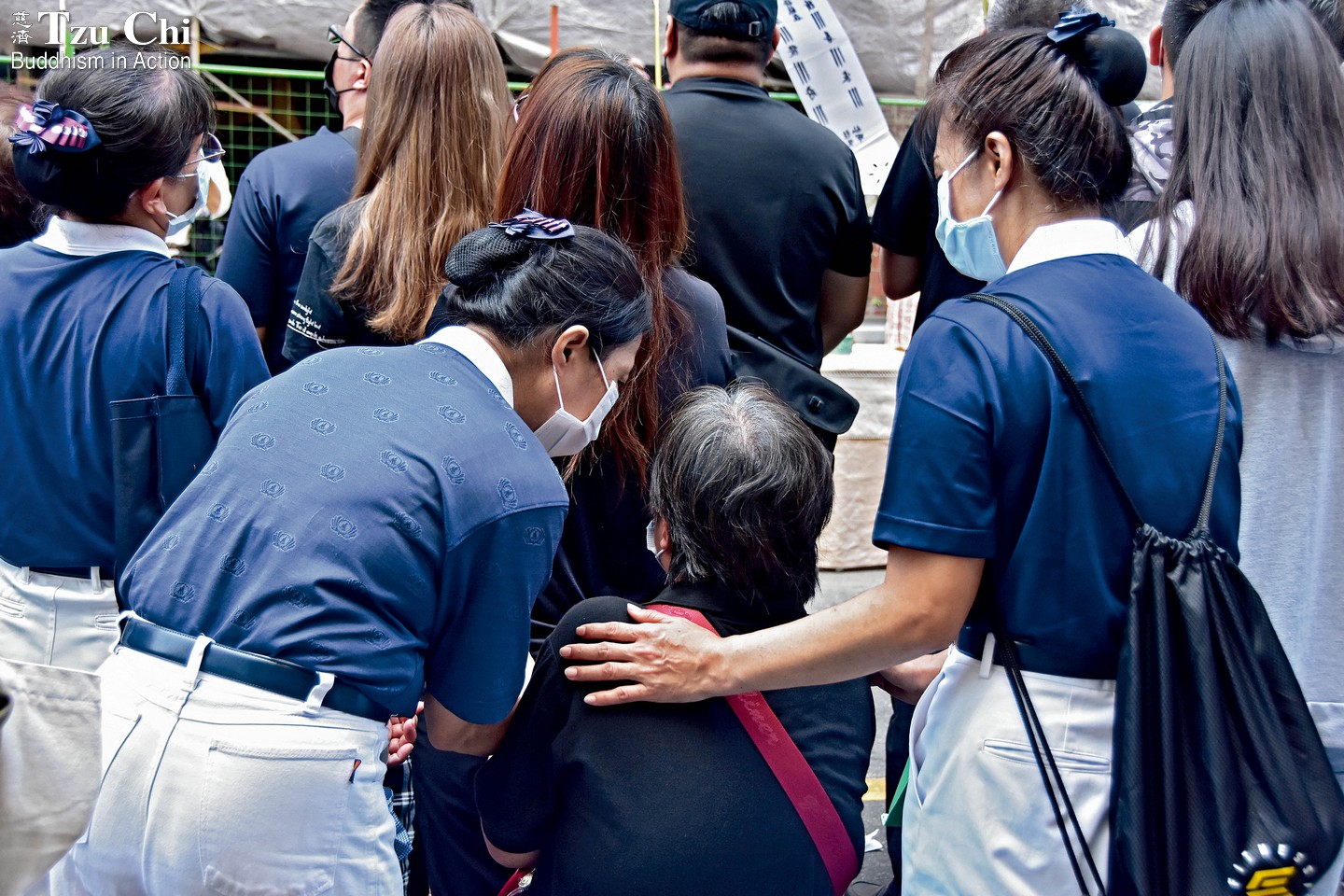
Volunteers serve at the soul-summoning ritual in the aftermath of the fatal fire. Zhang Jian-kun
The unforgettable taste of the peanuts
Every time a disaster hits, Tzu Chi volunteers can often be seen at the disaster site. Master Cheng Yen’s teaching inspires and guides us as we go among the needy to extend warmth and care: “When others are hurt, we feel the pain; when others suffer, we feel the sorrow.”
Our foundation signed a memorandum of cooperation with the Kaohsiung city government at the beginning of 2021. Since then, we’ve worked even more closely with the city. An example is the relief operation for this fire. We provided 50 body bags for the deceased in response to a request from the Fire Bureau. At the request of the Social Affairs Bureau, we also mobilized our volunteers to serve at the funeral home, the soul-summoning ritual, and the collective funeral service.
Another example of cooperation occurred a couple of months before the fire, in August 2021. Torrential rains brought by a typhoon had wreaked havoc in the mountains of Kaohsiung, tearing apart the only bridge to an area that had been particularly hard hit. Following reports of people missing, a search and rescue effort was launched by the Fire Bureau. After an overnight search, the firefighters mobilized for the mission were worn out and hungry, their supplies running low. The Fire Bureau contacted Tzu Chi and asked if our foundation could provide water and food for the rescue personnel.
When Fang Han-wu (方漢武), a Tzu Chi volunteer who owns several chain bakeries in Kaohsiung, learned about the need, he notified his stores to take their bread off the shelves to be delivered to the rescue team. He also had hot, steaming coffee prepared for the team. At 2:00 p.m., when the food was ready, volunteers Zheng Yang-qing (鄭楊慶), Cai Hui-ling (蔡慧玲), Li Xiu-chuan (李琇釧), Wu Zong-hua (吳宗樺) and I set out by car to deliver the goods to the rescue team. In addition to the bread and coffee prepared by volunteer Fang, we also brought them drinking water and canned sweet multi-grain porridge.
We arrived at our destination in Taoyuan District after driving for more than two hours. It was cold up in the mountains, even more so because of the rain. Having been carrying out their search and rescue mission in such conditions, many firefighters were moved when they received our food. One of them said, “What a blessing it is to have bread to eat and hot coffee to drink during a rescue effort.”
We set off on our return journey some time after seven p.m., having successfully completed our delivery mission. Our stomachs growled non-stop in hunger as we traveled down the mountain. Only then did it occur to us that we had eaten next to nothing that entire day. Even though we had just delivered a carload of food, we had not remembered to save any food for ourselves.
We searched the entire vehicle to try to find some food to eat. Our efforts yielded only a packet of peanuts, which we split among us. It was nine by the time we arrived back in the urban district of Kaohsiung. I was exhausted and starving, but buoyed by an indescribable, satisfying sense of fulfillment. As for that bag of peanuts, though they were salty in my mouth, they left a sweet taste in my heart.

